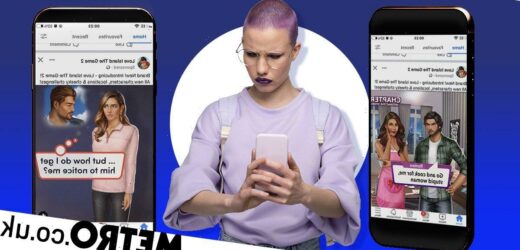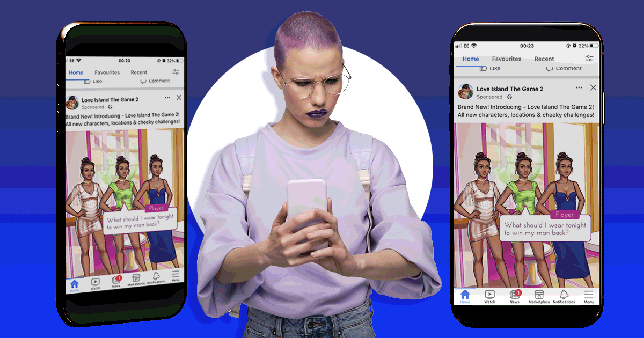‘Go and cook, you stupid woman’.
It might sound like an advert from the 1950s, but mobile phone game app companies are using slogans like this to reel in players – it was the exact line used at the opening of an advert we spotted for an interactive game available through the Apple Store and Google Play.
This isn’t a one-off. Watch a single advert for a game and Facebook guesses you’re ‘interested’ in this type of content, so an onslaught of further ads come from a mix of app developers.
‘But how do I get him to notice me?’, ‘What should I wear tonight to win my man back?’, ‘I’ll shave my legs and wear makeup’ are just some of the lines we saw.
In 2022, sexism still sells.
Here’s the catch though – these ads often don’t match up to the reality of the game, according to players and an ex-employee at one of these companies.
Getting clicks
Grace, a gamer who switches on a couple of times a week, says adverts for the game Choices: Stories You Play, are entirely different to her experience of playing.
‘Usually they aren’t true at all,’ she says, speaking of the sexist ads she’s noticed.
‘I came across Choices a few years ago through social media, and the initial ads interested me because I like relationship-based games.
‘I have since seen a few of those [sexist] ads and mostly I am just like “Huh?”’
In Grace’s opinion, ‘the game is quite respectful to women’ and is it ‘romance focused’.
She says you can buy outfits to impress a love interest, but it’s your choice to do that.
‘There are strong female characters in the games generally,’ she adds.
‘I think the game itself isn’t sexist and lots of female characters are represented positively and interestingly, so I don’t know why they advertise like that.
‘I think the point is to shock people or confuse them so they check out the app, but I don’t know if that’s a good strategy because it’s so weird.’
An anonymous ex-employee of Pixelberry Studios (who create some of the games with questionable advertising) confirmed to Metro.co.uk that bizarrely, this does generate clicks.
They say: ‘I was told that many companies in that industry used ads like that because the ads were successful in generating click-through rates and app downloads.’
It was talked about in the office too, regarding both Pixelberry and their competitors who use similar ads, as our source continued: ‘There was definite concern expressed by multiple people in the studio regarding competitor’s ads particularly since they often were depicting violence against women.’
They also disclosed that adverts were created by an external company, and they weren’t sure whether sexism featured in the design briefs.
‘I sure hope not,’ they add, ‘being that the Pixelberry Studio workforce was around 50% women – which is much higher percentage than any other studio I’ve worked for – so I’d expect that they wouldn’t intentionally ask for that.’
Shock factor
Outrage and shock do have the potential to make us look at something and remember it for longer.
Caroline Plumer, psychologist at CPPC London explains: ‘Outrage or shock can trigger our stress hormones, in turn setting off our flight, fight or freeze response.
‘Some people may look away (flight) whereas those who experience a freeze response, and feel incapacitated by their emotional reaction to it, may be unable to look away.
‘The confronting nature may mean some people have difficulty forgetting what they have seen.’
This will be why some people feel compelled to comment and share their disgust – and also why they’ll remember the ads, which is of course is a primary goal in advertising.
These feelings are often expressed in the comments sections under these videos, with some previous ones reading: ‘This is so toxic’, ‘I hope that no young girl decides to play this horrific and degrading game’, ‘Let’s play a game which seems to encourage body shaming, low self-esteem and bullying all in one place’ and ‘What the hell is this? If a woman looks good enough she might just get herself “a man”? What an insulting and pathetic message’.
Engagement goal perhaps achieved, but in the same breath, there are standards to uphold.
Can these ads be banned?
Toby King, of the ASA (Advertising Standards Authority), tells Metro.co.uk: ‘We have strict rules around the advertising for video games.
‘Ads should accurately reflect the content of a game, or make it clear when the imagery shown is not part of the actual gameplay.
‘They must also be careful when showing violent or sexual imagery; ads with such imagery should be targeted away from under-18s, and not be offensive or condone violence.
‘Our rules also make it clear that ads must not contain anything that is likely to cause serious or widespread offence, and must be socially responsible. This includes gender stereotyping, objectification or portraying one gender as worse than another.’
He can’t comment directly on the ads in this article, as it could influence any future investigations of them.
However, he does share that sexism within game ads has been a long-standing issue – suggesting more needs to be done.
Toby continues: ‘Last year we banned an ad for the mobile app game Gold and Goblins, which showed a man picking up a chair as if to strike a woman with it, but stopping as he watched her play the game.
‘We considered that this trivialised and condoned the serious and sensitive subject of domestic violence, and banned the ad.
‘In 2017, we banned an ad for Blade Of Queen that showed a woman lying down and facing away from the camera, with text in button stating “Fondle” and “Ravage”. We considered these were non-consensual actions and therefore referred to acts of sexual assault, and so we banned the ad.
‘We encourage anyone with concerns about ads they’ve seen to get in touch.’
One woman with concerns about these ads has been trying to instill change on her own.
Jodie Langford, an artist known as Bode Burnout, has recently started petitioning to ban these kinds of ads after seeing them continuously.
Speaking to Metro.co.uk, she says: ‘The first time I saw the cartoon ads were maybe six months ago playing an app game. They have become more and more frequent.
‘Recently just saw one that just tipped me and I just thought how can this be allowed if Facebook gives a f*** about people’s health?
‘They make me feel angry that as progressive as the world is trying to become there are still people who care more about money than the life issues of millions of people.
‘They use these ads that clearly target insecurities and old fashioned sexiest ideations but at the same time can start to look normal to the impressionable young children watching them over and over and over again.’
Jodie watched one portraying a woman’s body changing (by enlarging her breasts and shrinking her waist), then felt she had to at least try to get these ads banned.
She continues: ‘These ads should be properly reviewed and deleted and not accidentally allowed.
‘They appear not only on Facebook but on Apple apps where there isn’t even a way to report them.
‘They send awful messages about looks and growing up being obsessed with what you eat and look like.
‘We don’t need another generation of people feeling shame about trivial things like body hair and a belly and then ruining their life and health over it.
‘Eating disorders literally kill people but if I post an ad for something with the word sh*t in it, it will get denied immediately.’
She believes they’re ‘harmful’ to see, especially by the eyes of the young people more likely to play video games – both for girls and boys.
‘We can’t expect things to change with this type of advertising perpetuating the idea that this behaviour is normal,’ she adds.
It’s saddening that these ads aren’t policed by those hosting them, rather upset outsiders are having to go the extra mile to report them – and nothing is stopping these companies creating new versions.
There’s even a Facebook group called ‘A group where we only share cringey mobile game ads’ with 32.3k members, dedicated to jesting about all kinds of ridiculous ads – some of which perpetuate outdated gender stereotypes.
Jemima Olchawski, CEO of the Fawcett Society, tells us these adverts are undeniably ‘incredibly sexist’.
‘Women are portrayed as being innately disgusting unless they follow really prescriptive beauty requirements,’ she says, ‘and it’s telling that in all of these promo videos, it’s just female characters this is happening to.
‘We are particularly worried about the impact this has on girls and young women, who are an increasing market for online games.
‘Over a third of seven to 10 year old girls say that they are made to feel their looks are their most important attribute.
‘Social media platforms need to recognise the harm these games have the potential to cause, and stop them from advertising.’
But will they? It seems they’re running rife unless called out – and even then, the ads still show up.
Facebook, Pixelberry Studios (the creator of Choices), Apple and Google Play were contacted, but none wanted to issue a comment. If any do, we will update this story.
Crazy Maple Studio, the creator of Chapters, said: ‘We have no control of where the ads being displayed and when we advertise, we strictly follow the rules that our ads can only be displayed on 17+ App or Game.’
Do you have a story to share?
Get in touch by emailing [email protected].
Source: Read Full Article




